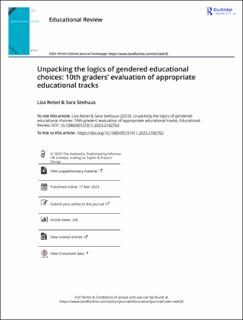Unpacking the logics of gendered educational choices: 10th graders’ evaluation of appropriate educational tracks
Peer reviewed, Journal article
Published version
Permanent lenke
https://hdl.handle.net/11250/3069220Utgivelsesdato
2023Metadata
Vis full innførselSamlinger
- Publikasjoner fra CRIStin [715]
- Tidsskriftpublikasjon [388]
Originalversjon
10.1080/00131911.2023.2182762Sammendrag
This study aims to unpack one element of the logics of gendered educational choices, namely how cultural beliefs about gender can shape young people’s judgements about gendered educational tracks. Through a survey experiment conducted among secondary school students in Oslo, Norway, we assess respondents’ judgements about fictitious students’ “appropriate” educational choices presented through short vignettes. The study investigates how judgements vary according to the gender of the fictitious students, as well as respondents’ gender and their gender essentialist beliefs. The results indicate that devaluation of female-typed work play a role in young people’s judgements about educational tracks. Boys and girls alike seem to award male-typed vocational education and general college preparatory education higher status than female-typed vocational education. Nonetheless, vignette boys are more strongly advised against choosing female-typed vocational programmes than vignette girls with the same characteristics. This pattern is evident regardless of respondents’ essentialist beliefs. Thus, both devaluation and gender stereotypical expectations pull in the same direction for boys, against entering female-typed education in upper secondary school. Furthermore, the findings indicate that gender essentialism works asymmetrically. Respondents with gender essentialist beliefs are more likely to advise girls not to choose male-typed vocational programmes. However, we did not find evidence that respondents, including those who otherwise express gender essentialist beliefs, believe that female-typed vocational educational choices are appropriate for women simply because they are women. Unpacking the logics of gendered educational choices: 10th graders’ evaluation of appropriate educational tracks
